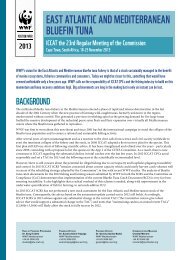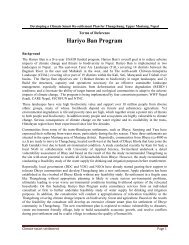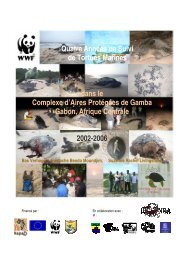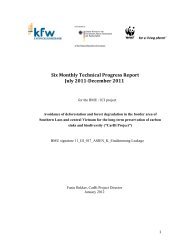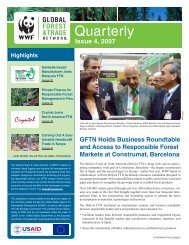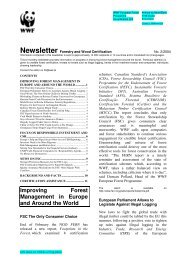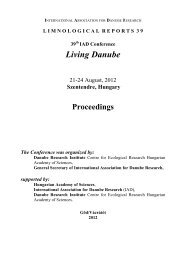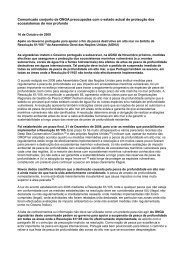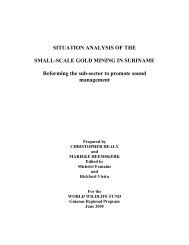The South Africa – Viet Nam Rhino Horn Trade Nexus (PDF ... - WWF
The South Africa – Viet Nam Rhino Horn Trade Nexus (PDF ... - WWF
The South Africa – Viet Nam Rhino Horn Trade Nexus (PDF ... - WWF
You also want an ePaper? Increase the reach of your titles
YUMPU automatically turns print PDFs into web optimized ePapers that Google loves.
situation at the source: south africa<br />
2008 2010 Estimates for five missing provinces (for 2010)<br />
3361<br />
4750<br />
1428 377 1032<br />
2837<br />
0 1000 2000 3000 4000 5000<br />
<strong>Rhino</strong> horn in privately-owned stockpiles (kg)<br />
560 3921<br />
Estimates based on<br />
Emslie’s data (in<br />
Milliken et al., 2009b)<br />
Estimates based on<br />
Hall-Martin et al., 2009<br />
Official stockpile <strong>–</strong> estimates from<br />
DEA and SADC RMG data<br />
Figure 19 Estimates of private sector rhino horn stocks contrasted with latest horn stock data from December 2010<br />
as much as 70% (Figure 19). Indeed, if the average White <strong>Rhino</strong> horn size is four kilogrammes (Martin,<br />
1983), <strong>South</strong> <strong>Africa</strong>’s data for private sector stocks in 2009 is under-reported by up to 830 rhino horns or<br />
415 rhinos.<br />
In view of these apparent discrepancies, the TRAFFIC/IUCN rhino document to CITES CoP15 concluded:<br />
Whilst the shortfall between reported and expected horn stocks does not confirm that illegal activity is<br />
widespread in <strong>South</strong> <strong>Africa</strong>’s private sector, it does strongly suggest that significant volumes of rhino<br />
horn still remain outside of the legal control system and are vulnerable to undocumented trade in the<br />
hands of unscrupulous individuals. That fact, and the failure of five provinces to report private horn<br />
stocks, indicates that implementation of <strong>South</strong> <strong>Africa</strong>’s control policy for rhino horns is inadequate at a<br />
time when illicit trade is escalating (Milliken et al., 2009b).<br />
Law enforcement personnel report numerous instances in which they believe privately-owned rhino<br />
horns have been illegally sold, and there have been active investigations in Eastern Cape, Gauteng, Free<br />
State, Limpopo and Mpumalanga provinces (R. Taylor, in litt. to TRAFFIC, 2009). Initially, government<br />
authorities had some success in preventing registered horns that were held under possession permits<br />
from being sold to non-<strong>South</strong> <strong>Africa</strong>n nationals. Later, it became apparent that such horns were being<br />
transferred to certain bona fide citizens who in turn sold the horns to foreigners, sometimes subsequently<br />
reporting bogus thefts. In at least one such case, the legally-acquired horn was traded through Port<br />
Elizabeth, Eastern Cape province, only to finally surface in Indonesia; one of the middlemen in this<br />
instance, presently awaiting prosecution, allegedly received ZAR30 000 (approximately USD3600) for<br />
his efforts in the deal (R. Taylor, in litt. to TRAFFIC, 2009). Indeed, one wildlife industry insider at the<br />
PROA National <strong>Rhino</strong> Summit in November 2011 stated that the national moratorium on rhino horn<br />
trade, by ending the unofficial supply of rhino horn from private horn stockpiles into the illegal international<br />
market, is what led to the subsequent rise in rhino poaching in <strong>South</strong> <strong>Africa</strong>.<br />
In some instances, private sector operators have actively created rhino horn stockpiles with a view to<br />
future legal trade or use. One such individual, John Hume, reportedly has:<br />
Date Location/Museum No. horns Weight (kg) Comments<br />
Nov 02 Transvaal Museum, Gauteng 1 Unknown White rhino. Daylight robbery.<br />
ZAR150 000.<br />
Dec 06 Graaff-Reinet House Museum,<br />
Eastern Cape<br />
Oct 07 Graaff-Reinet House Museum,<br />
Eastern Cape<br />
Dec 07 Amatole Museum, King Williams Town,<br />
Eastern Cape<br />
1 9 White <strong>Rhino</strong>. 120-year-old exhibit.<br />
Break-in at night.<br />
2 2 Mounted on pieces of wood.<br />
Stolen out of gun safe by day<br />
visitors.<br />
1 Unknown Daylight robbery by four armed<br />
men.<br />
Mar 08 Oudtshoorn Museum, Western Cape 1 Unknown Mounted on piece of wood.<br />
Break-in.<br />
Apr 08 <strong>South</strong> <strong>Africa</strong>n/Iziko Museum,<br />
Western Cape<br />
2 Unknown White <strong>Rhino</strong> dating from 19th century.<br />
Also unsuccessfully attempted<br />
to remove Black <strong>Rhino</strong> horns.<br />
Unknown Lumarie Game Farm, Bela-Bela, Limpopo 3 Unknown <strong>The</strong>ft<br />
Unknown Game farm, Bulgerivier, Limpopo 1 Unknown White <strong>Rhino</strong>. <strong>The</strong>ft.<br />
Unknown Leshoka Thabang, Roedtan, Limpopo 6 Unknown White <strong>Rhino</strong>. <strong>The</strong>ft.<br />
Unknown Elkland Safaris, Makhado, Limpopo 3 Unknown <strong>The</strong>ft<br />
Unknown Grahamstown Albany Museum,<br />
Eastern Cape<br />
1 Unknown Fake horn.<br />
Unknown Bedford, Eastern Cape 1 Unknown Game ranch.<br />
Jun 09 Addo National Park, Eastern Cape 1 10.5 Micro-chipped. Armed Robbery.<br />
Jun 09 Grahamstown, Eastern Cape 16 Unknown Game ranch.<br />
Unknown Thomas Baines Nature Reserve,<br />
0 0 2 firearms and safe stolen in belief<br />
Eastern Cape<br />
horns inside the safe.<br />
Apr 10 Taxidermist, Limpopo 18 Unknown Daylight armed robbery.<br />
Oct 10 Thaba Manzi Lodge, Limpopo 7 Unknown White <strong>Rhino</strong>. Armed robbery<br />
plus two firearms. ZAR15 000<br />
cash, cell phones and a laptop<br />
computer.<br />
Total 65 21.5<br />
Table 6 Reported thefts and losses of rhino horn within <strong>South</strong> <strong>Africa</strong> (data from Law and Policy Programme, EWT)<br />
over 500 kg of white rhino horn individually measured and registered with the provincial government,<br />
implanted with government-issued micro-chips, similar to the ones inserted in pets, and housed in safetydeposit<br />
boxes at three banks around the country, awaiting a time when trade would be legal (Borrell, 2010).<br />
In fact, this individual has reportedly at least once sold rhino horn within <strong>South</strong> <strong>Africa</strong> prior to the<br />
national moratorium:<br />
Until recently, horn buyers advertised openly in Game & Hunt magazine for “tusks and rhino horns”<br />
that have been “legally obtained.” It is legal to trade horn within <strong>South</strong> <strong>Africa</strong>’s borders with appropriate<br />
permissions. Hume followed up on one such offer in July 2006, when he obtained permits to ship 84 kg<br />
of horn to a buyer in the North West province of <strong>South</strong> <strong>Africa</strong>. Hume believes the horns subsequently left<br />
the country. He sold the horn for just ZAR8000 (US$1200) per kilogram (Borrell, 2010).<br />
<strong>Horn</strong> thefts<br />
A related illegal trade in rhino horns concerns thefts of private or State-owned rhino horn stocks. As<br />
the value of rhino horns has increased over time, rhino horn stocks are under increasing risk of theft.<br />
At least 37 horns have been reportedly stolen from game ranches, whilst a series of other incidents<br />
have resulted in thefts of a minimum of nine horns, including a fake specimen, from educational or<br />
decorative displays at various museums within <strong>South</strong> <strong>Africa</strong> (Table 6). A taxidermist reported losing<br />
64 the south africa <strong>–</strong> viet nam rhino horn trade nexus TRAFFIC 65



